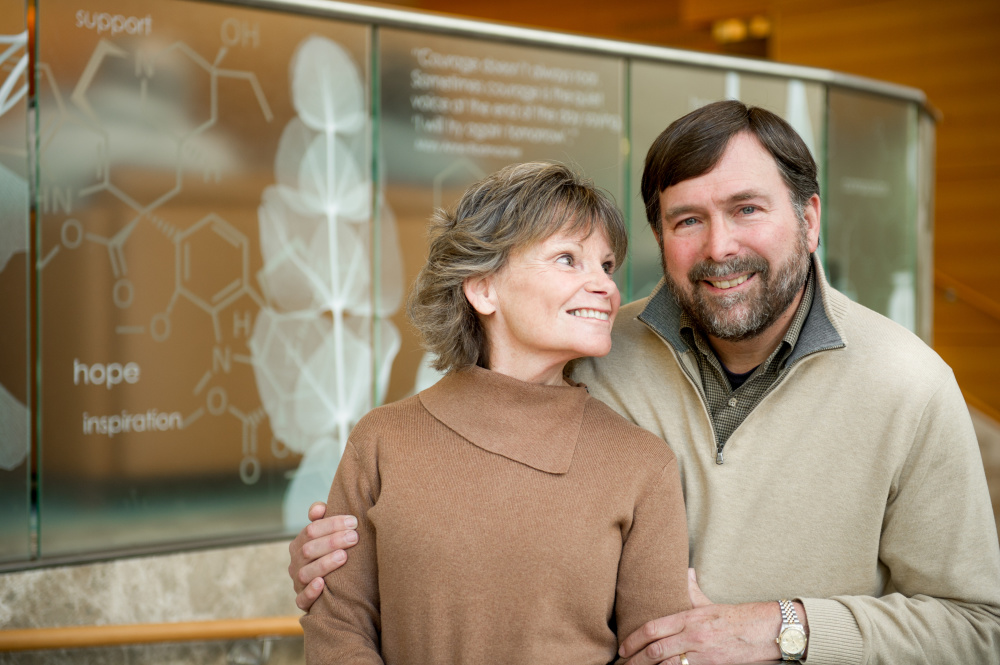Original post date: November 20, 2017
Reposted from the Dana Farber Blog
By Allan Osborne
Although most caregivers are related to us, cancer patients like myself often receive care and support from non-family members, such as friends and colleagues. It’s important for us to reflect on the important role our caregivers play in our overall treatment.
In my opinion, our caregivers have a much harder job than we patients do. They are on duty around the clock, and they don’t get any paid holidays or vacations. I shudder to think about how I could have gotten through this journey without my wife, Deb Osborne, at my side.

I often joke with Deb about taking care of herself, saying, “If anything happens to you, who will take care of me?” But there is a lot of truth to that. Caregivers are often told that to be effective they must take care of themselves first, since it can be very stressful watching a loved one go through treatment. And while it is true that they must take care of themselves so that they can better care for us, there is much that we can do to make sure that they remain healthy.
In other words, we need to take care of our caregivers, too.
Sometimes our caregivers are so focused on us, they forget about their own health. They may put off making appointments for themselves for routine care, such as annual physicals. They may even ignore their own ailments. We need to give them gentle reminders, and even insist if necessary, so that they will go to doctors when they need to.
When my father was caring for my mother, who had Alzheimer’s disease, I noticed that he was neglecting his own health. “I don’t care what happens to me,” he told me. I had to remind him that my mother would be lost without him, and that it was important for him to keep up with his own health care. He agreed that I was right.
Our caregivers’ social lives also tend to suffer, because we patients may be limited in what we can do. Particularly after a stem cell transplant, when we are isolated from the world, our social activities are significantly curtailed. Still, that doesn’t mean that our caregivers must also be isolated. We need to encourage them to take time out to visit with friends, go out to lunch, and do other things they would like to do.
Let’s face it. Taking care of cancer patients is no picnic. There is so much we can’t do ourselves. When I was at my worst, Deb had to not only do the household tasks she usually handled, but she also had to take on everything I normally did. On top of that, she had the responsibility of meeting my health care needs. Add to that the stress of living with someone who was seriously ill. If that isn’t a recipe for stress, I don’t know what is.
What can we do to relieve some of that stress? We can start by not doing anything to add to it. I think it’s important for cancer patients to make sure that all of our legal and financial affairs are in order, so that our caregivers don’t have to worry. We can also make sure that our caregivers get proper rest, eat well, and get some exercise, and know that it’s O.K. for friends and other family members to give them a break now and then.
I remember the first time Deb went out with some friends when I was in treatment. She was reluctant to leave me. She did, however, ask Ed, a neighbor and good friend, to come over to keep me company. While I didn’t think that I needed a “babysitter,” I realized that she would feel much better knowing that someone was with me. Ed and I had a nice visit and Deb had a much-needed break.
We should be diligent in watching for signs that our caregivers are experiencing burnout. If we think they are, then we should encourage them to take some steps to mitigate it — whether that means spending quality time doing the things they enjoy, or joining a support group for caregivers. And, when it’s possible, maintaining a sense of humor throughout the cancer experience can help.
And, of course, we need to let them know how much we appreciate everything they do.